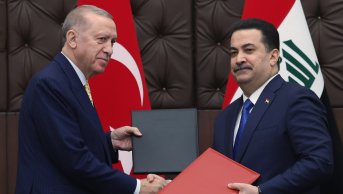Germany's Middle East Policy

Being one of the most important economies in the world, Germany has the fourth largest Gross Domestic Product and its foreign trade volume ranks third in the world. It survived as the most stable country in Europe, which was highly damaged during the world economic crisis in 2008-2009 and strengthened its determinant position within the European Union (EU) with its distinguishing policies of economic assistance to the crisis-ridden countries. However, it is not possible to say that Germany, which is such efficient economically, follows a policy on the Middle East, which is the adjacent zone of the EU, as actively as the USA or Russia. It is seen that Berlin generally follows a policy that accepts the leadership of the USA in the Middle East in spite of certain periodic differences, but tries to divert the government of Washington in order to hinder the developments conflicting especially its economic interests.
We should first underline Germany’s economic interests while analyzing the factors which influence the formation of its Middle East policy. Peaceful resolution of problems and stability are very important for Germany, a trading nation whose foreign trade volume is equal to its national income. The development of trade with all the countries in the world underlies the economic potential of Berlin although the share of Middle East countries in Germany’s foreign trade isn’t as big as Europe and the other developed countries. Middle East countries rank among the important markets of German industrial goods and arms industry in this context. Similarly, German companies are among the countries which make the biggest foreign capital investments in the Middle East. Within this framework, Berlin adopts an attitude based on the protection of German companies’ investments in the Middle East and the export enhancement in the countries within the region while shaping its Middle East policy. At this point, the role of the USA as the most active power in the Middle East and its impact on the Middle East policy of Germany comes into play.
As a trading nation, Germany both needs to receive the support, leadership and cooperation of Washington and soften it up from time to time. Germany, which itself is not a great military power, is in need of the security assistance of the USA, which is the protecting force of ‘the West’ in order to conduct its economic activities in the Middle East as well as in the other regions of the world. Within this framework, the support of the USA as Germany’s ally is significant in order for Germany to hold on economically to the Middle East, which includes a great number of countries and armed organizations which can be identified with anti-western sentiment. In return for this support, Berlin becomes prominent as one of the countries financing the military operations of the USA in the region with certain exceptions. Gulf War in 1991 can be given as an example. The opposition of social democrats and greens in Germany to the war which the USA waged on Iraq without the approval of UN Security Council in 2003 is among the exceptions. The influence of the USA on the Middle East policy may differ according to the parties in power in Washington and Berlin. Thinking about the Middle East policies that the USA followed under the Republican government destabilized the region and damaged its own economic activities, Germany either opposed these policies or tried to soften up Washington depending on the quality of the government in Berlin. The ‘critical dialogue’ policy that Germany and the other European countries followed against Tehran can be considered to respond to the USA policy which rejected the dialogue concerning Iran until the presidency of Obama.
Another factor influencing the formation of Germany’s Middle East policy is the Holocaust, which occurred during the Nazi government that defined its relations with Israel and policy of Arab-Israeli conflict. Having been founded in 1949, Federal Republic of Germany took the responsibility for the Holocaust and paid a tribute of nearly 71 billion eurosto the Jewish by the end of 2013. Apart from this payment which was rendered and still continues under different namessuch as tribute, pension payment, social assistance and settlement support, Germany also sent economic and military assistance to the Israeli government and supported Israel’s aggressive policies of in the region. Germany was the leading country that provided the biggest diplomatic support to Israel during its attacks in Lebanon in 2006 and in Gaza in 2008-2009 and in 2014. Berlin didn’t withdraw its support from Israel although this country caused the death of over one thousand civilians in each attack and committed countless war crimes. However, it is necessary to underline that the Holocaust that Berlin regrets doing in its history isn’t the only reason for the strong support to Israel. When the pressure that Jewish lobbies in the USA put on Berlin to support Israel which is the ally of this country, is considered, Germany’s unwillingness to have problems with the government of Washington can be seen as one of the reasons for such intense support to Israel.
Security concerns are also one of the prominent subjects which determine Germany’s Middle East policy. The increase in radicalism in the region resulting from the conflicts and instability in Middle East countries and the transformation from radicalism to terrorism are seen as a serious threat in Germany as well as the other countries in Europe. Germany is concerned about the rise of organizations like the ISIS and Al-Qaeda and the high involvement rates of young Muslims living in Europe in these organizations. The possibility that these militants may go back to the countries where they came and the aforesaid organizations may start their acts of violence in the European territory has become one of the problems against which Germany feels obliged to take measures.
Another threat perception of Berlin originating from the Middle East is the illegal migration which puts heavy pressure on Germany and the other European countries. The instability inthe Middle East, especially in North Africa has led to an increase in the number of refugees going to Europe in recent years. Refugees’ achieving their objectives constitutes an important problem for European countries which generally strengthen their border security to hinder this surge of refugees. One of the objectives of Berlin’s Middle East policy is to hinder this surge since refugees prefer to go to richer countries like Germany instead of staying in the countries such as Italy, Greece and Spain, where they first arrive in Europe. Human rights constitute another dimension of illegal migration problem for Germany. The increase in the death rates of migrants as a result of the recent accidents in Mediterranean Sea also triggers the reaction of human rights defenders in Germany to the government which they accuse of being incompetent to prevent these accidents.
There has been too much discussion of human rights, but this factor has the least effect on the shaping of Germany’s Middle East policy. Even though human rights protection and democracy promotion have frequently been placed at the agenda of Middle East countries at the level of discourse, the economic and security interests prevents a determined stance on these issues. Within the framework of this distorted perception of interests, Berlin remained silent on the coup and massacres following the coup in Egypt just as it did in Algeria in 1992 and in Turkey in 1997. It still remains silent on Israel’s continuous massacres in Gaza and the other regions for the same reasons.
Apart from the exceptions such as Schröder government between the years 1998-2005, economic interests, security concerns and the USA, which has a strong Israeli lobby, continue to be the key determinants of Germany’s Middle East policy instead of human rights and democracy.
This article was published in Ortadoğu Analiz journal with the title of "Germany's Middle East Policy”









